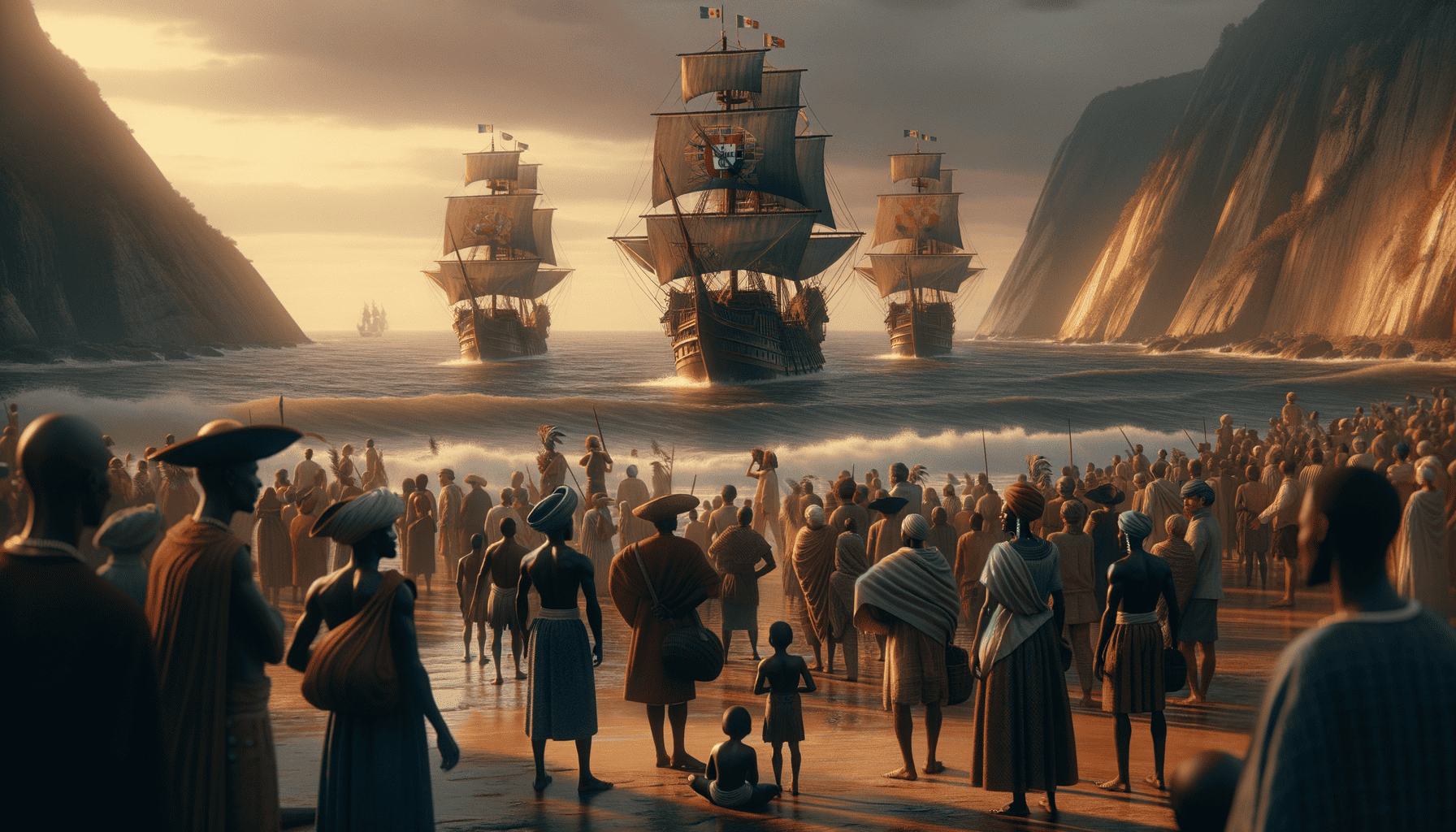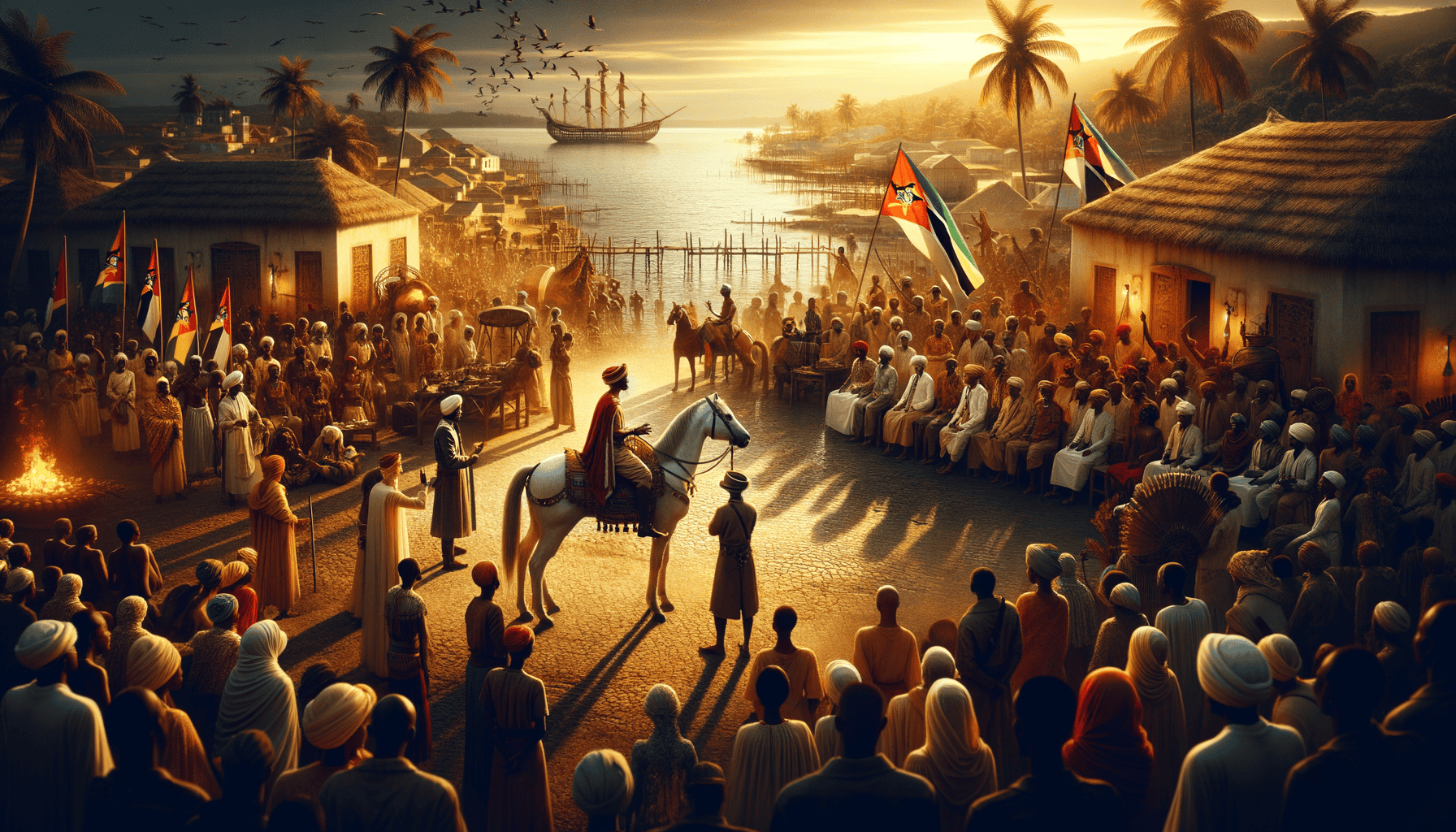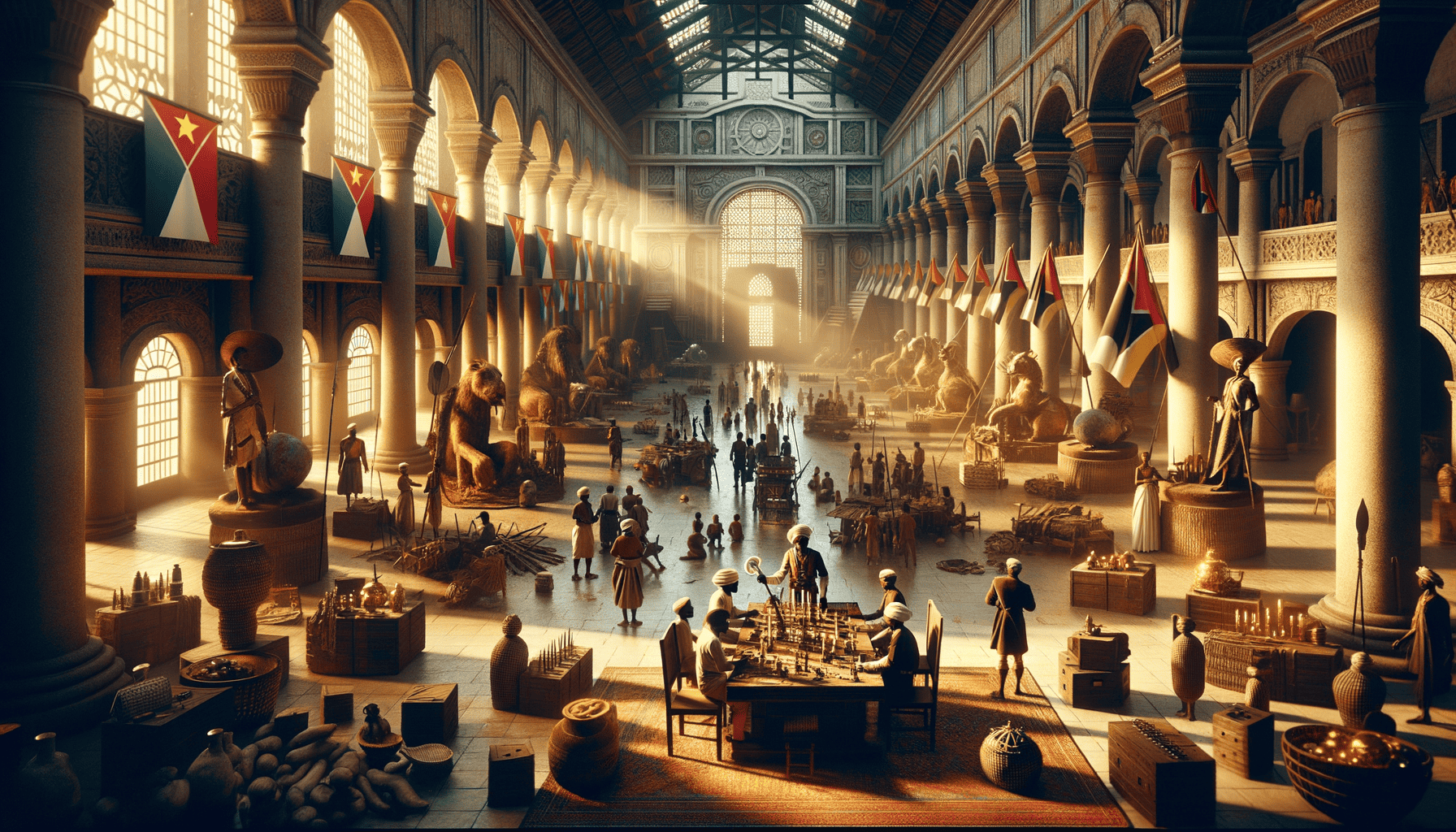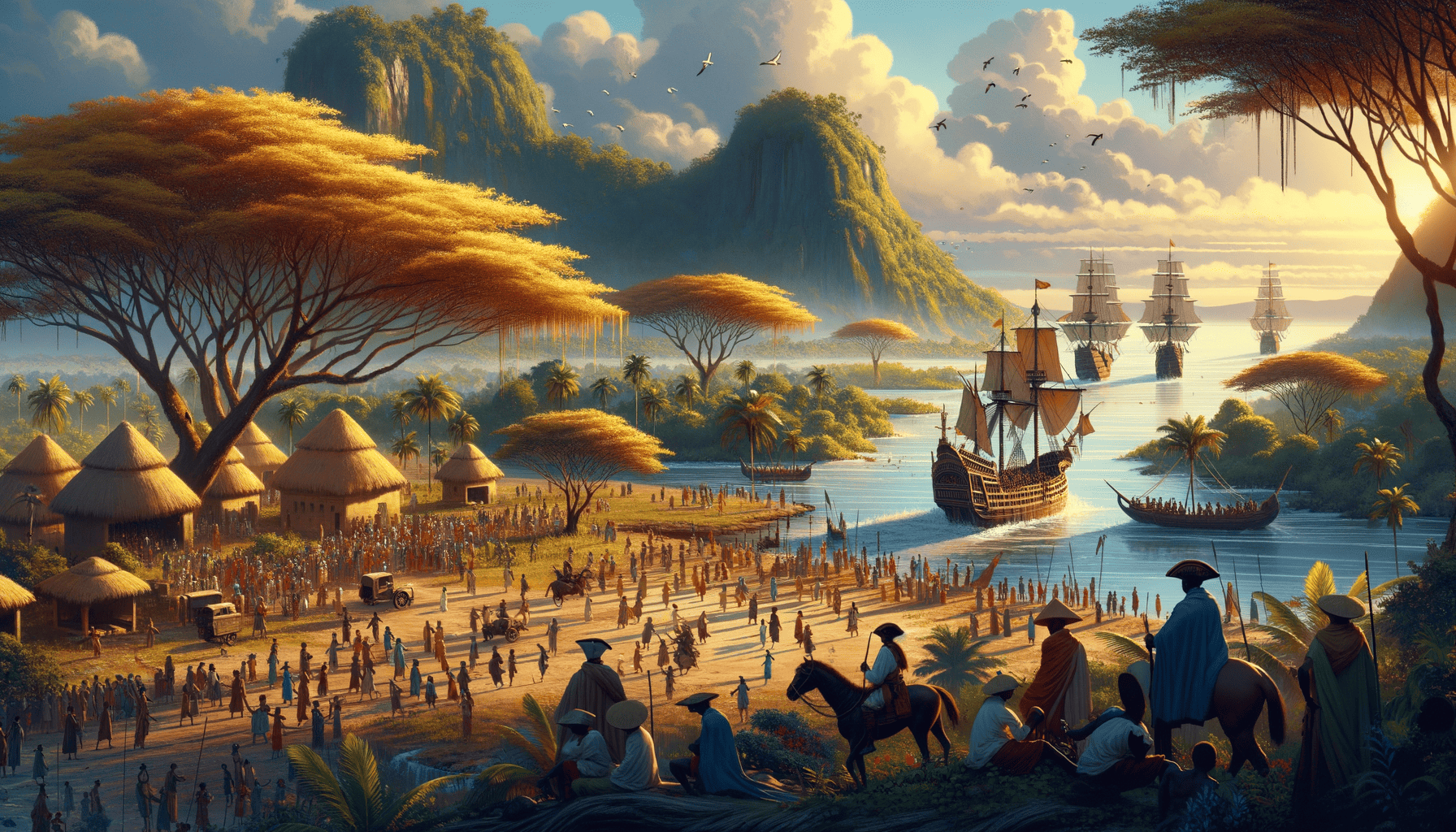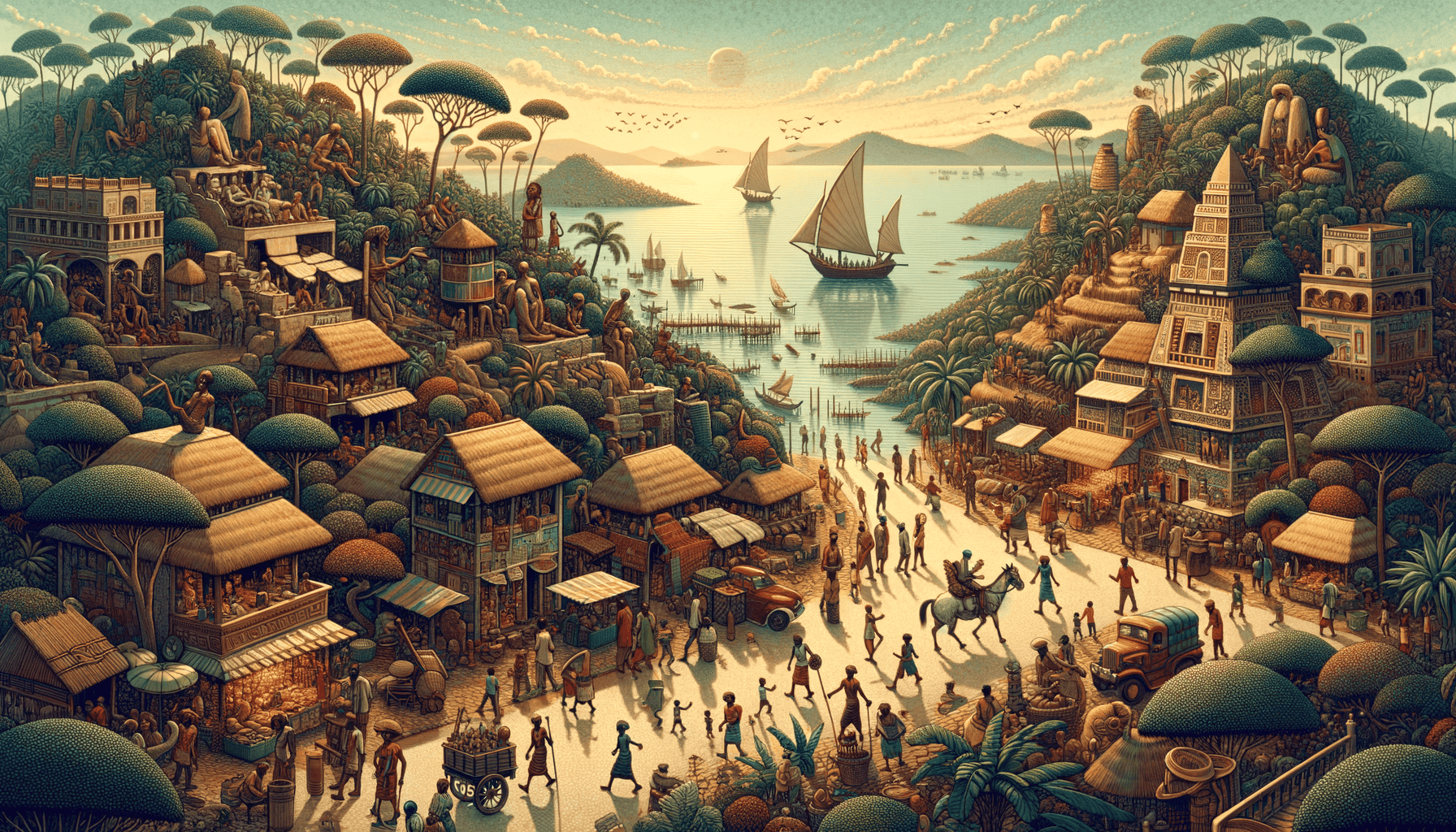A Land of Ancient Wonders
Long ago, in a beautiful place called Mozambique, people lived in a very special way. The land was full of tall trees, flowing rivers, and amazing animals.
Little Amara loved hearing stories from her grandmother about their ancestors. They would sit under the shade of a giant baobab tree, its branches spreading wide like open arms.
"Tell me about our people, Grandmother," Amara would say, her eyes sparkling with curiosity.
The First People
"Our story begins many, many years ago," Grandmother began, her voice warm like honey. "The first people here were hunters and gatherers. Do you know what that means?"
Amara shook her head.
"They were very clever people who found food in the forest. They hunted animals and picked fruits and berries. They were just like detectives, following animal tracks and knowing which plants were good to eat! "
Life by the Ocean
Some families lived near the big, blue ocean. They learned to fish and trade with people who came on boats from far away lands. These visitors came from places like Arabia and Persia, bringing shiny things to trade.
"What did they trade, Grandmother?" Amara asked.
"Oh, many wonderful things! They brought colorful cloth, pretty beads, and special spices. Our people gave them gold, ivory, and beautiful shells from the ocean. "
Growing Communities
As time went by, small villages grew into bigger communities. People learned new ways to grow food and make things. They built homes from clay and grass, and created paths between villages to visit each other.
"The most important thing," Grandmother said, touching Amara's hand, "was how people helped each other. Everyone had a job to do:
• Some people were farmers who grew food
• Others made beautiful pots and baskets
• Many were storytellers who kept our history alive
• Some were healers who knew about special plants
• And others were traders who traveled to different villages"
Special Skills
"Did you know that our ancestors were amazing at making things?" Grandmother asked. She picked up a beautiful woven basket. "They could turn simple grass into beautiful baskets like this one. They made tools from stone and metal, and knew how to find water even in dry places! ️"
Living with Nature
Amara loved hearing about how her ancestors lived with nature. They understood when rains would come by watching the birds. They knew which plants could heal sick people. They took care of the land and only used what they needed.
"But Grandmother," Amara said, "everything changed when new people came from across the ocean, right?"
Grandmother nodded slowly. "Yes, my dear. That's when our story took a new turn. But that's a tale for another day."
The sun was setting now, painting the sky in beautiful orange and purple colors. Amara looked at the old baobab tree and thought about all the stories it must have seen. She felt proud to be part of such an amazing history.
Little did Amara know that her grandmother would soon tell her about the big ships that came from far away, bringing new people who would change everything…
Ships from Distant Shores
The sun was rising over the ocean when Amara and her grandmother met again under their special baobab tree. Today’s story would be different – it was about the day big ships appeared on the horizon.
“What did the ships look like, Grandmother?” Amara asked eagerly.
“They were huge, like floating houses with tall white sails that touched the sky,” Grandmother explained, spreading her arms wide. “The year was 1498, and the ships carried people called Portuguese, led by a man named Vasco da Gama.”
First Meetings
“At first, our people were curious about these strange visitors,” Grandmother continued. “They had never seen people with such pale skin or such different clothes. The Portuguese brought new things like glass beads, metal tools, and colorful cloth.”
“Did they become friends?” Amara wondered.
Grandmother’s face grew serious. “At first, they traded peacefully. Our people shared gold, ivory, and spices. But soon, the Portuguese wanted more than just trade.”
Changes in the Land
The Portuguese began building stone houses and big forts along the coast. They wanted to control the trade routes that our people had used for hundreds of years. They built places like Ilha de Moçambique, which became very important.
Here’s what the Portuguese brought to Mozambique:
• New foods like cassava and corn
• Different ways to build houses
• New languages and customs
• Different ways to farm
• New tools and weapons
Life Under New Rules
“Many things changed when the Portuguese stayed,” Grandmother said softly. “They started taking control of our land. They made our people work in fields and mines. They tried to change our ways of living.”
Brave Hearts
“But we were strong,” Grandmother said proudly. “Many of our leaders fought back. They protected our culture and our ways. People like Queen Nzinga showed great courage.”
Amara sat up straighter. “Tell me about the brave people, Grandmother!”
“Some refused to follow Portuguese rules. Others kept teaching children our old stories and songs. Many escaped to places in the mountains where they could live freely.” ✊
New Ways of Living
Life changed a lot during this time. Some people learned to speak Portuguese. New towns grew bigger. Traditional villages became different. But people found ways to keep their old customs while learning new ones.
“Like mixing the old dancing with new music?” Amara asked, remembering the festivals she loved.
“Exactly!” Grandmother smiled. “Even today, we can see how both old and new ways live together.”
The afternoon wind rustled through the baobab leaves. Amara thought about the big ships and all the changes they brought. She was sad about the hard times, but proud of how strong her people were.
“Grandmother,” she said, “what happened next? Did our people keep fighting?”
Grandmother patted her hand. “That’s another story, little one. A story of great courage and hope…”
Rising Voices of Freedom
The morning sun painted golden patterns through the baobab leaves as Amara settled next to her grandmother. Her eyes sparkled with curiosity about what happened after the Portuguese came.
“Did our people just accept the Portuguese rules, Grandmother?” Amara asked.
“No, little one. Our people were brave and strong. Many heroes stood up to fight for our freedom.” Grandmother’s voice filled with pride. ✨
The First Fighters
Grandmother pulled out a colorful cloth and spread it on the ground. “Let me tell you about our heroes. Chief Makombe was one of the first. In 1892, he told his people: ‘We will not be slaves in our own land!'”
“What did the Portuguese do to make people so angry?” Amara wondered.
“They made our people work very hard in fields and mines. They took our land. They wanted us to forget our languages and customs,” Grandmother explained. “But we never forgot who we were.”
Keeping Our Culture Alive
People found clever ways to keep their traditions:
• They told stories at night
• They sang special songs while working
• They danced their traditional dances in secret
• They taught children the old ways
• They kept speaking their own languages
“The Portuguese didn’t like this,” Grandmother continued. “But our people were smart. They pretended to follow Portuguese ways in public while keeping their true culture alive at home.”
New Leaders Rise Up
“As time went on, more leaders appeared,” Grandmother said. “They started groups to fight for our rights. They wrote letters and held meetings. Some even went to school to learn new ways to help our people.”
“Were the Portuguese scared of these new leaders?” Amara asked.
“Yes, they were. They put many leaders in jail. But for every leader they stopped, two more would stand up!”
Working Together
Different groups began working together. Farmers, workers, and students joined hands. They shared one big dream – to make Mozambique free.
“People from other countries helped too,” Grandmother added. “They sent food, medicine, and supplies. They told the world about our struggle.”
Hope Grows Stronger
By the 1960s, more and more people joined the fight for freedom. They held peaceful protests. They wrote songs about liberty. They taught others about their rights.
“The Portuguese tried to stop them,” Grandmother said. “But you can’t stop people who want to be free. It’s like trying to hold back the ocean!”
“What happened to all these brave people?” Amara leaned forward eagerly.
Grandmother smiled mysteriously. “Their courage led to something amazing. But that story needs special telling. Would you like to hear about the big change that was coming?”
Amara nodded excitedly, ready to learn more about her people’s journey to freedom.
The Dream of Freedom Takes Shape
Amara bounced with excitement as Grandmother pulled out an old photo. “Today, little one, I’ll tell you about how our people came together to win our freedom.”
A New Group Forms
“In 1962, something special happened,” Grandmother began. “Brave people from all over Mozambique formed a group called FRELIMO. They had one big dream – to make Mozambique free!”
“Who led these brave people?” Amara asked, eyes wide with wonder.
“A very smart man named Eduardo Mondlane,” Grandmother smiled. “He was like a teacher who became a hero. He brought people together and taught them to work as one big team.”
The People Unite
Grandmother pulled out a colorful woven mat. “See how these threads work together? That’s how our people joined hands:”
• Farmers from the fields
• Workers from the cities
• Teachers from schools
• Doctors from hospitals
• Students from universities
“Everyone had a job to do,” Grandmother explained. “Some people wrote letters. Others made speeches. Many brave ones joined the army to fight.” ✊
Friends Around the World
“We weren’t alone,” Grandmother continued. “People from other countries helped us too! They sent:”
• Food for hungry families
• Medicine for sick people
• Books for students
• Radio sets to share news
• Training for our fighters
“Even children helped!” Grandmother’s eyes twinkled. “They carried messages and sang freedom songs. Every person did their part.”
The Big Fight Begins
“Did we have to fight?” Amara asked softly.
“Yes, little one. In 1964, our freedom fighters went into the forests and mountains. They were brave but careful. They protected villages and taught people about freedom.”
“The Portuguese had big guns and planes,” Grandmother explained. “But we knew our land better. We were fighting for our homes, our families, and our future.”
Moving Forward
Years passed. More and more people joined FRELIMO. They started schools in free areas. They helped sick people. They grew food for villages.
“But it wasn’t easy,” Grandmother sighed. “Some brave leaders died. Eduardo Mondlane was killed by a bomb in 1969. But new leaders stepped up. The fight went on.”
Victory Gets Closer
“In Portugal, people started saying the war should stop. They were tired of fighting too. More countries told Portugal to let Mozambique be free.” ️
“Our fighters got stronger. They won more battles. They controlled more land. Freedom was getting closer!”
Amara leaned forward eagerly. “What happened next, Grandmother? Did we win?”
Grandmother smiled warmly. “That’s another amazing story, little one. Would you like to hear about the day Mozambique finally became free?”
Amara nodded enthusiastically, ready to learn about her country’s greatest victory.
The Dawn of Freedom
Amara snuggled closer to Grandmother, eager to hear more. “Tell me about when we won our freedom!”
The Big Day Arrives
“On June 25, 1975, the sun rose on a new Mozambique,” Grandmother’s eyes sparkled. “People filled the streets. They danced and sang. Our flag flew high for the first time!”
“What happened to the Portuguese?” Amara asked.
“They packed their bags and went home,” Grandmother explained. “We could finally run our own country! But we had lots of work to do.”
Building Our New Home
The first leader of free Mozambique was Samora Machel. He had big dreams:
• Make new hospitals
• Fix broken roads
• Help farmers grow food
• Teach people to read
“It was like fixing up an old house,” Grandmother said. “Everyone helped. Some people became teachers. Others became doctors. Many worked in farms.”
Hard Times Come
“But not everyone was happy,” Grandmother sighed. “Some people started fighting again. They broke things we had just fixed.”
“Why did they do that?” Amara frowned.
“Sometimes people disagree about how to make things better,” Grandmother explained gently. “But even in hard times, we kept working to build our country.” ✊
Working Together
The new government made big changes:
• Free schools for children
• Doctors in villages
• Better farms
• New factories
• More jobs
“Women could now do important jobs too!” Grandmother smiled. “They became leaders, teachers, and doctors. Everyone had a chance to help.” ⚕️
Growing Stronger
“Did everything get better right away?” Amara asked.
“No, little one. Change takes time. We had many problems:”
• Broken roads
• Too few schools
• Many sick people
• Little money
“But we didn’t give up!” Grandmother’s voice grew stronger. “We worked harder. We helped each other. Slowly, things got better.”
Hope Grows
“By 1992, the fighting stopped. People came together again. We started building new things:”
• Big bridges
• Better roads
• More schools
• New hospitals
• Modern farms
“Other countries helped too,” Grandmother added. “They sent teachers, doctors, and builders. They gave us tools and machines.”
Looking Forward
“Today, we still have work to do,” Grandmother smiled. “But we’re getting stronger every day. More children go to school. More people have jobs. More families have good homes.”
Amara looked thoughtful. “So even when things were hard, people kept trying?”
“Yes, little one. That’s what makes our country special. We never stop trying to make things better.” ⭐
Amara hugged her grandmother tight. “Tell me more about our country today!” she begged.
Grandmother smiled warmly. “That’s another wonderful story, my curious one. Would you like to hear about modern Mozambique?”
A New Dawn for Mozambique
Amara bounced excitedly on Grandmother’s lap. “Yes, please tell me about our country today!”
Growing and Changing
“Today’s Mozambique is like a beautiful garden that keeps growing,” Grandmother smiled. “Our cities are getting bigger. New buildings touch the sky!” ️
“What do people do now?” Amara asked.
“So many things!” Grandmother’s eyes twinkled. “Some work with computers. Others build roads. Many still farm, but with better tools.”
Our Special Culture
Music filled the air as neighbors danced outside. “Listen,” Grandmother pointed. “Our music and dance tell our story. We keep our old songs but make new ones too!”
Colorful paintings decorated the walls. “Artists paint our history. They show our dreams for tomorrow. Our culture is like a rainbow – full of beautiful colors!”
• Traditional dances
• Storytelling
• Colorful art
• Tasty food
• Special clothes
Growing Food and Business
“We grow lots of good food now,” Grandmother explained. “Corn, cassava, and sweet fruits. Farmers use new ways to grow more food.”
“And look at the busy market!” She pointed out the window. “People sell things they make. Some even sell to other countries!”
Learning and Health
“More children go to school now,” Grandmother beamed. “They learn to read, write, and use computers. Some even learn in their local languages!”
Working with Friends
“We have friends all over the world now,” Grandmother said proudly. “They help us build things. We help them too. It’s like having a big global family!”
“Countries near us are our closest friends. We share food, music, and ideas. Together, we all grow stronger!”
Dreams for Tomorrow
Amara looked thoughtful. “What’s next for Mozambique, Grandmother?”
“We have big dreams, little one:” ⭐
• Clean water for everyone
• Jobs for young people
• Better roads everywhere
• More schools
• Happy, healthy families
“But the best part?” Grandmother hugged Amara close. “Children like you will help make these dreams come true!”
The Story Continues
“Remember, Amara,” Grandmother’s voice was soft. “Mozambique’s story is like a long, beautiful song. Each generation adds new verses.”
Amara stood up straight and proud. “I want to help make Mozambique even better!”
Grandmother smiled. “You already are, my dear. Every time you learn something new, every time you help someone, you make our country stronger.” ❤️
As the sun set, casting golden light across their home, Amara knew she was part of something special – the continuing story of Mozambique, a land of hope, strength, and endless possibilities.


